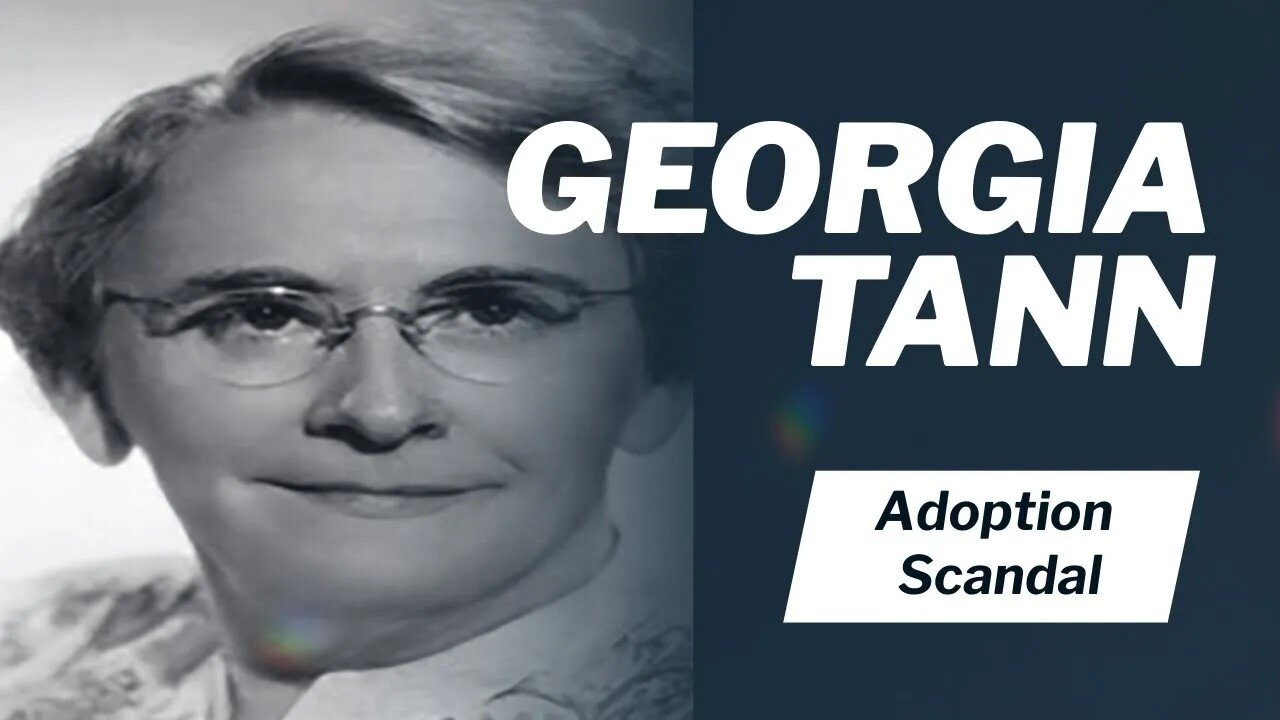Premium Only Content

Uncovering the Georgia Tann Adoption Home Scandal
Georgia Tann was born in 1891 in Mississippi. She studied music in Virginia and wanted to be a lawyer, but her father, a judge, disagreed. She later learned social work in New York, which was one of the few options for women then. She worked at Mississippi Children's Home Society but lost her job in 1924 for taking kids from homes unfairly, a haunting preview of what she would later achieve. After a brief stint in Texas she moved to Memphis, Tennessee
Helped by her father’s connections, Tann got a job at the Tennessee Children's Home Society. This society was the biggest one of its kind in the state. Ever ambitious, Tann soon staged a takeover and seized control of this organization. Once in charge, Tann began bending the rules and trafficked children from poor families to wealthy ones.
In the early 1900s adoptions were relatively rare but a shifting public sentiment towards the practice and the popularization of baby formula, which made it easier for some mothers to feed their babies, helped Tann’s business grow.
Tann used deceitful tactics to take kids. She lured them with rides and bribed officials. Tann often resorted to legal threats, social humiliation and other ruses to pressure parents such as poor, single moms to give their kids to her.
Tann also targeted babies, preying on poor and destitute women at homes for unwed mothers, welfare hospitals, and prisons to obtain them. Tann bribed social workers, police officers, doctors, and lawyers to help her get away with her schemes.
Tann approached wealthy couples to adopt the children including famous names like Joan Crawford and Lana Turner. New York Gov. Herbert Lehman was also a client. Lehman was also known for making a law in 1935 to keep the birth certificates of adopted kids secret.
According to Tennessee's laws, adoption agencies could only charge for their service and not the children. The society followed this rule and charged around seven dollars for adoptions in the state. But in other states, particularly wealthy regions like New York and California, Tann would change anywhere from $750 to $10,000 for a child.
Tann would pad her income with fees for background checks, home visits, airplane tickets and paperwork, which was often forged. Tennessee also gave Tann's agency $61,000 every year, with about 31 percent of that money going to the Memphis branch.
Before arriving at the Society, parents were unaware of their kids' pasts and if adoptive parents asked too many questions, Tann would threaten legal action or say that she would take the child away from them.
The children often suffered neglect, abuse, and even death in Tann’s care. In the 1930s, Memphis had the highest mortality rate in the nation, which was partly due to Tann.
In 1943, a donor gave a large house to the society, Children here were overseen by unqualified workers including pedophiles and drug addicts and the kids were routinely mistreated. Some died from malnutrition and other preventable illnesses.
In the 1940s, Tann became so brazen in her adoption schemes that she even ran lucrative Christmas raffles where people would buy tickets for the chance of receiving a baby.
It was only in 1949, after two decades of child trafficking, that Tann came under scrutiny for her practices.
Tennessee elected a new governor, Gordon Browning, and E.H. Crump, a close associate of Tann and, a key figure in Memphis politics, lost influence.
Browning investigated Tennessee Children's Home Society and the home closed in 1950. Browning disclosed that Tann's child-selling operations earned $1 million, which would be more than $12 million today. Tann died on September 15 from cancer before she could be tried.
Tann’s child trafficking led to widespread devastation. Families were torn apart, birth parents were deceived, and adoptive families were kept in the dark. Many of the children involved grew up struggling with their identity and a past they couldn't understand. Others died needless, avoidable deaths.
It's believed that Tann took more than 5,000 children during the decades that she ran her scheme.
This scandal transformed U.S. adoption, leading to stricter regulations and more child safeguards. Placing children with influential people also made adoption more accepted.
The Tennessee Children's Home Society scandal was a tragic reminder of the need to protect children in safe, loving homes.
Photo credits - Fortepan, Goldduxxt, Colonelinfo, Carolyn gregory @ wikicommons
Music theme - Trumpets in Your Ears by Wowa & Chris Rede @unminus.com
-
 LIVE
LIVE
LFA TV
3 hours agoLFA TV ALL DAY STREAM - TUESDAY 9/2/25
8,929 watching -
 5:15:18
5:15:18
Times Now World
7 hours agoLIVE | Xi and Putin Unite in Beijing For China's Military Day Parade & WW2 Victory Day
108 -
 1:27:10
1:27:10
JULIE GREEN MINISTRIES
2 hours agoLIVE WITH JULIE
41.8K125 -
 LIVE
LIVE
The Bubba Army
4 days agoChicago BloodBath! 54 Shot, 7 Dead- Bubba the Love Sponge® Show | 9/02/25
3,812 watching -
 2:01:30
2:01:30
BEK TV
4 days agoTrent Loos in the Morning - 9/2/2025
8.63K1 -
 10:47
10:47
Nikko Ortiz
19 hours ago15 Seconds Of Fame Gone WRONG...
124K14 -
 14:47
14:47
GritsGG
1 day agoRumble Tournament Dubular! Rebirth Island Custom Tournament!
83.9K5 -
 1:36:05
1:36:05
Side Scrollers Podcast
21 hours agoStreamer ATTACKS Men Then Cries Victim + Pronoun Rant Anniversary + More | Side Scrollers
93.5K13 -
 LIVE
LIVE
Lofi Girl
2 years agoSynthwave Radio 🌌 - beats to chill/game to
239 watching -
 42:55
42:55
Stephen Gardner
1 day ago🔥Trump’s SURPRISE Move STUNS Everyone - Democrats PANIC!
118K131